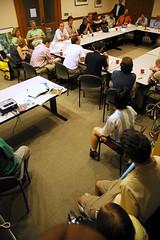
City Hall for last night’s Bicycle
Advisory Committee meeting.
File photo: 5/8/07
Symbolic of the pent-up demand for more mountain biking in Portland, nearly 40 people crammed into the Lovejoy Room inside City Hall last night for the most crowded Portland Bicycle Advisory Committee (PBAC) meeting I’ve ever attended.
The agenda for the night was cleared to make room for a mini-summit on mountain biking (or the lack thereof) in Portland; which has long been a neglected part of our cycling story.
The committee, which advises City Council on all matters related to bicycling, heard from both advocates and citizen cyclists who came to share their frustrations over a lack of off-road riding opportunities in and around Portland and their willingness to help change that reality.
In addition to the usual suspects, the committee was joined by several special guests including; board members of the Portland United Mountain Pedalers (PUMP); Roger Louton, President of PUMP and Western Region Rep for the International Mountain Bicycling Association (IMBA); Jim Sjulin, North Zone Manager (which includes Forest Park) for Portland Parks and Rec; Chris Distefano, formerly a board member of the IMBA and now marketing director for Chris King Precision Components; Scott West, Chief Strategic Officer for Travel Oregon, Veronica Rinard with the Portland Oregon Visitors Association; and local framebuilder Tony Pereira.
The mountain biking presentation opened with PUMP’s Tom Archer. Trying to find common ground between the historically transportation-oriented focus of the PBAC, he shared his view that most mountain bikers also commute to work and that that they have “a lot more shared interests than differences” with the PBAC.
He went on to say that he wants Portland to look at how other cities have integrated mountain bike trails into urban areas,
“We think mountain biking can be part of a commuting network. In a lot of places around the country, mountain biking is moving into an urban setting in the form of skills parks, urban trails…and in many cases people are linking small sections of singletrack to the commuting network…we see a lot of opportunity for that in Portland.”
He also stressed that mountain bikers intend to be not just trail users, but stewards, and that they’re,
“willing to put some hard work into this…we really think we can be an asset to the community.”
Archer then handed off to PUMP’s President and Western Region Rep for IMBA, Roger Louton. Louton took the committee through a slide show titled, “Portland mountain-biking: The case for improving riding opportunities.” The presentation was a crash course in mountain biking and introduced the PBAC members to what mountain biking, and mountain bikers, are all about.
He told us that an authentic mountain biking experience comes with riding singletrack, but that the current Forest Park Management Plan only allows mountain bikes on “trails” that are at least eight feet wide. He also shared results of a recent study that on a properly built trail, (responsibly ridden) bicycles have no more impact than hikers (who he warned are increasingly using carbide-tipped poles that could do more damage than bikes).
Louton also pointed out success stories like the I-5 Colonnade Skills Park built under the freeway in Seattle. That project took just $30,000 and one month to build.
“I’m here because I love Portland and I love mountain biking, and I see a bit of a gap between those two”
-Chris Distefano
Next to share his views was Chris Distefano. Distefano is a 15-year bicycle industry veteran who, prior to moving to Portland three years ago, spent 10 years as head of public relations for Shimano America. Distefano spoke with an impassioned sense of purpose and his rousing speech (audio available below) marked an exciting new era for mountain bike advocacy in Portland.
He told the committee how he was “absolutely devastated” that Portland did not even warrant a mention in a recent NY Times article about how cities across the country are putting a priority on urban mountain biking.
“In this city, to have an authentic outdoor experience on a mountain bike in the natural world, cyclists have to drive at least than two times longer than they ride…I believe that’s inconsistent with the values of this city…and I moved here because of the values of this city.”
“If we’re going to say we’re America’s best city for bicycles — which we were and may still be — let’s not forget other cities saw us as number one, and they came after us, the same way the Red Sox went after the Yankees.”
Distefano also shared the social and economic elements of increased mountain bike access,
“Back in Orange County…I had pizza with friends every Wednesday night for 10 years. We spent $9,000 a year at New York Pizza. You talk to the shops on 23rd…would they like to have an infusion of cash like that? I think they would.”
“We’re not asking for huge infrastructure…it doesn’t take much money…it’s a lot of sweat equity and if you do it right a trail will last forever. Mountain bikers don’t destroy things, jerks destroy things. We want to be stewards, we are not users, we are not extracting resources.”
“…we’re not mountain bikers, we’re all one big group. Let’s work together on this.”
- Download MP3 (11 MB, 12 min 25 sec long)
Listen to Chris Distefano’s speech.
[audio:distefanoBAC.mp3]
A Q&A session followed and some interesting comments were made by Jim Sjulin of Portland Parks and Recreation. He admitted that his agency has not dealt enough with the popularity of mountain biking,
“We’re overdue in dealing with the quick rise in this activity.”

File photo: 5/8/07
He also said he looks forward to working with mountain bike advocates but warned, “we’re never going to go as fast as you’d like us to on this.”
Sjulin seemed sincere in his willingness to work on this issue and suggested that an upcoming Forest Park Management Plan update would be a “great train to be on” for mountain bikers. He also made it clear that he must balance the interests of hikers and runners, and that there’s a lot of work to be done for mountain bike advocates.
But Forest Park access is just one of the issues mountain bikers brought to the table. They want to see little bits and pieces of trails get put in wherever possible.
It won’t be easy, and many challenges await this renewed mountain bike access effort. One of them was summed up by Chris Distefano when he mentioned that the “bike loyalty” in this town has always been made up of “transportation people” and that it will be “tough to crack into that.”
Luckily it looks as though they are on the right track. In the coming weeks, city bike coordinator Roger Geller will experience his first dose of singletrack mountain biking when he joins PUMP members for a ride out in Scappoose.
For more coverage of mountain biking issues in Portland, see my archives.



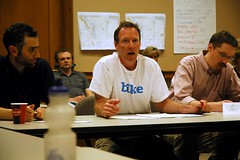
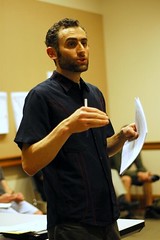
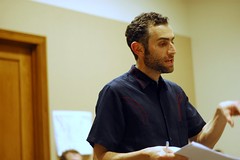
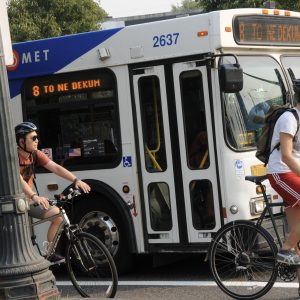


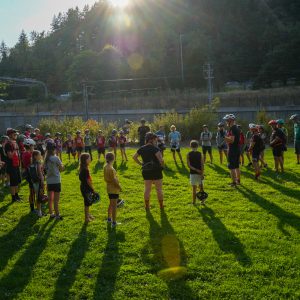
Thanks for reading.
BikePortland has served this community with independent community journalism since 2005. We rely on subscriptions from readers like you to survive. Your financial support is vital in keeping this valuable resource alive and well.
Please subscribe today to strengthen and expand our work.
“We’re overdue in dealing with the quick rise in this activity.”
I bought my first mountain bike in 1984, that’s over 20 years that they’ve had to ‘deal’. As I’m sure Parks and Rec are aware, due to the lack of trails in Washington Park, people are making their own trails.
Oh Great just when I thought the internet was a safe place, I now have CD’s voice being broadcast over my computer. HAHa just kidding!
Thank you for your coverage Jonathan. Great job to everyone who took part.
I’m really bummed I had to miss this, but now I feel like I got to go! Thanks, Jonathan.
PUMP and IMBA are looking forward to meeting with ALL who want to help in this long term endeavor! Stay tuned for an upcoming MTB Summit, where YOU will be asked to step up to the plate, put forth some effort and (gasp) give up some saddle time and help out your local, 100% volunteer, MTB club, PUMP…
Actions speak louder than words!
http://www.IMBA.com
http://www.PUMPCLUB.org
This is a great start. Since Forest park is such a popular active park does anyone think working on underutilized parks would make more sense? Take Kelly Butte Natural Area
http://www.portlandonline.com/parks/finder/index.cfm?action=ViewPark&PropertyID=210&c=38308
Right now its a pretty beat up Butte, but that’s a great opportunity for the mountain bike community to come in an clean the place up and add a bunch of single track.
This was a terrific meeting and hopefully a start to getting singletrack mountain biking here in Portland. I have been to quite a few gatherings on this topic over the past year and and ultimately many issues come down to the Parks Department. It would be great to see Commissioner Dan Saltzman take a lead role on this. Dan, please come out, we would love to talk with you!
I think key questions are what does it mean to have a “an authentic outdoor experience on a mountain bike in the natural world” and where and how much do we try to provide it?
I have lived and biked in Portland my entire life. Many years ago I use to mountain bike in Forest Park fairly regularly (on fire lanes and on Leif Erikson). While I no longer mountain bike in Forest Park, I can appreciate why some would want to.
I am personally open to looking at how some access could be expanded for mountain biking but have a number of concerns that I think are and would be widely shared in the community in trying to answer the questions above. The existing and potential impacts of mountain biking on other forms of nature-based recreation, on water quality, on wildlife and their habitat, and on other ecosystem services provided by our city’s natural areas are a real concern. There is certainly a long history of trying to manage these conflicts in Forest Park, especially as usage has grown. There is a reason why mountain bikes are limited to trails only 8-feet wide.
I am concerned that some mountain bike enthusiasts- particularly those who cavalierly view expansion as a “no-brainer”- have expectations for access and usage in our city’s natural areas that would prove ruinous to a host of primary ecological and passive recreational values that they provide, even with the best intentions of some thoughtful mountain bikers.
So I would hope that plans move forward cautiously, inclusively, and collaboratively with the candor to recognize the real competing values and limits to the capacity of our urban natural areas to support mountain biking.
There may indeed be opportunities for expanding some access for mountain bikes (although I very much doubt Kelly Butte is a candidate) in degraded areas where enhancements and ongoing stewardship and monitoring are conditions for expanding access on a contingent basis.
In my view, that will take cooperation, civic and public investment, and adequate safeguards to control usage and impacts.
Jim Labbe
Urban Conservationist
Audubon Society of Portland
TheDude, I went up to Kelly Butte today to scout out to see it potential for MTB trails. I totally agree with you. There is currently a small trail network and I think that could be improved and expanded. I posted some photos on my flickr site. Click on my name on this post to view.
Before anyone gets to excited, it is worth remembering that Portland Public Parks has been very consistantly anti off road bicycling for all of the 20 years I’ve lived in Portland.
Off-road bikes, bmx, and skaters have suffered most due to the priorities of Portland Parks. Have you noticed how difficult it has been to site skate parks in Parks and how many “no bikes” signs show up every time a wooded area is developed into a park? In three years, all Parks has done is open one new skate park. Is it any wonder why most kids spend all their time inside playing video games and growing obese.
Have you also noticed how much money has been spent on golf and dog areas?
I hope that Portland Parks is changing their stance, but until I see some action instead of a bunch of words and promises of studies, I’ll assume its the same old same old.
Perhaps we need to look at the “progressive” city of Chattanooga, TN for inspiration. Chattanooga is working on a plan to build 100 miles of single track within 10 miles of the city.
Population of Chattanooga= 155,000
Bring on the single track!!
This is a very serious issue here, thank you Jonathan for covering it… and although Roger was a pompous ass the one time I rode with Pump, I do respect all the work he has been doing to try to get more trail access in Portland. It is completely ridiculous that there are so many miles of trails in Forest Park and so few miles of legal singletrack anywhere in the local area. Good to see that there is a positive movement going on to change that. I just hope the city, Portland Parks, and Friends of Forest Park will finally open their eyes to the nececity of trails in our area. Nowhere else that I’ve lived has there been such resistance to trail access.
If you want an answer as to why mountain biking shouldn’t be expanded in our parks, go and take a close look at Powell Butte.
Mountain bikers don’t limit themselves to established, well-worn trails. At Powell Butte, just about every nook and cranny in the forested section has seen bike use. The result is massive erosion, loss of native plants, and degradation for other uses. Ugly barricades had to be erected to keep bikes out… and they were uprooted.
The collateral damage by irresponsible mountain bikers is too high.
Peter,
This is exactly why the lack of trails must be addressed. There are only 29 miles of singletrack within the greater Portland area. Without proper trails, some irresponsible riders take it upon themselves. The answer is to create more correctly designed trails for bike use. A recent study found that mtn biking on correctly designed trails have the same or less impact as hikers. Doing nothing is just going to make matters like this worse over time.
Parks and Rec doesn’t do such a great job with on-road cycling issues either, the roads in Mt. Tabor and a lot of other parks could also be a lot more bicycle-friendly.
Jim Labbe wrote:
I think key questions are what does it mean to have a “an authentic outdoor experience on a mountain bike in the natural world” and where and how much do we try to provide it?
I think most mountain bikers would consider it to be a dirt trail 1 to 3 feet wide winding thru trees, up and down over rocks and tree roots, basically singletrack. There is tons of it in every park in Portland but it is illegal to ride bikes on them. Does anyone know if it has always been illegal or if it was made illegal during the first mountain bike boom?
Peter Bray wrote: If you want an answer as to why mountain biking shouldn’t be expanded in our parks, go and take a close look at Powell Butte.
Mountain bikers don’t limit themselves to established, well-worn trails. At Powell Butte, just about every nook and cranny in the forested section has seen bike use. The result is massive erosion, loss of native plants, and degradation for other uses. Ugly barricades had to be erected to keep bikes out… and they were uprooted.
The collateral damage by irresponsible mountain bikers is too high.
It really sounds like you are saying that ALL mountain bikers are of the “Extreme Downhill” variety, and are also the kind of people who don’t care about the environment. There are many MORE people who enjoy mountain biking at a relaxed pace winding through trees, getting that singletrack experience. I am sure that if you let them ride the trails some of them would be willing to maintain the trails, I know I would.
I listened to that whole audio clip and good lord, Chris Distefano is one hell of a good speaker.
Paul,
Which study are you referring to? The International Mountain Biking Association has clearly made efforts to fund and advertise information supportive of their point of view (not that there is anything wrong with that). We need good and accurate, and ultimately more local information and knowledge in making decisions in our region and community.
I reviewed a handful of studies that focus on specifically erosion impacts when comparing mountain biking to hiking mostly in wildland contexts and in regions much drier than ours. There indeed appears to be some peer-reviewed studies that suggest that the impacts of mountain bikes on soil erosion can, in some contexts, be no greater than hiking Every study cautioned about applying results universally and the need for more research.
The few studies that have looked at wildlife impacts appear to be more mixed.
Clearly opening more of our urban natural areas up to mountain biking would increase the volume of traffic (as well as the quality of traffic). This needs to be considered when evaluating the capacity of urban natural areas to support a multitude of other social and ecological values they provide.
Jim Labbe
Jim,
The study was from Shimano and was referenced at the committee meeting. As far as wildlife impacts, I am sure there are many studies out there. I have heard (but not read the study) that bird watchers are potentially very harmful as birders tend to almost ‘stalk’ wildlife, as opposed to a mtn biker that just moves by.
As far as Forest Park, the number of bikers going fast on Leif is perhaps more dangerous and harmful than opening up appropriate singletrack.
A great resource on this subject is the book “Managing Mountain Biking”.
http://www.imba.com/resources/bike_management/managing_mountain_bikes.html
Some of the trails near corvallis which are managed by OSU forests are closed to bikes in the winter when they are very muddy and susceptible to erosion, but they are open to bikes in the summer. Maybe forest park could be mountain bikeable at least part of the year if erosion is the concern.
Bjorn
Paul,
No argument here about the potential environmental impacts of birding.
Any outdoor recreational activity can have environmental impacts if
practiced in a damaging way or by too many people in one location.
However comparing the impacts of mountain biking to hiking, birding, or
any other existing recreation activity kind of sidesteps a key point. We
are not talking about prohibiting anyone from our natural areas (unless it
is everyone as is the case on the SE corner of Powell Butte), we are
talking about potentially ADDING mountain bikes and associated usage/impacts in SOME areas.
Forest Park should be a major concern. Even before adding more bikes,
there are other recreational impacts in Forest Park that need attention and management. And Forest Park is not just a recreational
resource. It is unlike many other natural areas; it is a massive
wildlife corridor extending almost to the heart of the metropolitan
region. The shape and location of Forest Park is probably more significant
than its size (it’s actually only the 10th largest in the nation according
to a recent study by the Trust for Public Land). This wildlife corridor
function more than anything is what makes Forest Park unique. It’s probably why we have vaux swifts at Chapman School, the occasional Elk in the City limits, and varied thrushes in many of our neighborhoods (at least as much as we do).
Again, I think there are certainly opportunities where adding more
single-track trails could have a net social and environmental
benefit if done right. However, there are also plenty of areas where adding them would
certainly be a social and environmental minus. There will be other areas
where it is debatable, where we should proceed cautiously or err on the
side of conservation. Our job as citizens- whether we are bikers, hikers,
birders or in many cases all three, is to be smart stewards of the
marvelous system of parks and natural areas we’ve been creating in the
Portland-Metro region over the last 100+ years. I am sure most folks who
ride mountain bikes would agree.
Jim
Jim,
Forgive me for not reading the 21 comments before yours, but it sounds like you are supportive of developing some single track opportunities within our urban boundaries. I’m glad for that. This city definitely needs some close-in mountain biking trails. It is something that I was accustomed to in other places I have lived and I have missed having that opportunity here.
All,
On my bike ride home last night I listened to Chris Distefano’s passionate speech on mtn biking in Portland and was extremely impressed. What a fantastic voice for this cause with an excellent message. Keep up the good work Chris and company. I’m excited to see results!
Jim,
Great hearing back and we all are working for a better Forest Park. So it appears your point is that you believe ANY added people in Forest Park is a negative, correct?